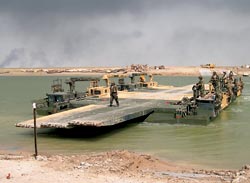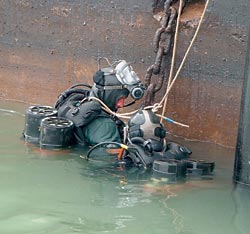59 Independent Commando Squadron Royal Engineers: Difference between revisions
No edit summary |
No edit summary |
||
| Line 9: | Line 9: | ||
The origins of the Brigade can be traced to the formation of the first Army Commando Units. | The origins of the Brigade can be traced to the formation of the first Army Commando Units. | ||
[[Image:Royal_chamois10_th.jpg]] | |||
Army Commando | Army Commando | ||
| Line 35: | Line 35: | ||
[[Image:Royal_chamois12_th.jpg]] | |||
all content on this Page courtesy of the MOD | all content on this Page courtesy of the MOD | ||
Revision as of 16:27, 22 May 2006
 59 Independent Commando Squadron Royal Engineers
59 Independent Commando Squadron Royal Engineers
59 Independent Commando Squadron Royal Engineers are a key component of 3 Commando Brigade Royal Marines. 3 Commando Brigade has always been at the forefront of operations, playing a leading role in the Balkans, West Africa, Afghanistan and Iraq.
The Brigade is a joint formation, capable of taking other manoeuvre and fire support assets under command. Designed to be expeditionary, it can be inserted by any means, is optimised as an amphibious formation, with the ability to project force without reliance on ports or airfields.
The inherent flexibility of such a force means that it packs a punch out of proportion to its size. It is the UK’s only formation trained in cold weather warfare and aims to train annually in an extreme cold environment (usually Norway). However, it also trains and operates in the mountains, desert and jungle.
The origins of the Brigade can be traced to the formation of the first Army Commando Units.
Army Commando
The term Commando originates from the South African War of 1899 – 1902. The Boers had no regular forces, apart from the Staat Artillery, which was officered by Dutch and Germans and their Police. Consequently they raised bands of men based on electoral districts.
They were called Commandos, and each man was responsible for providing his own horse and received no pay or uniform. Commando tactics were marked by lightning strikes on the British Forces, with the Boers fading away into the veldt before the British could react.
Although by October 1900, the British had virtually defeated the Boers in the field, it was the activities of the Commandos, who would not surrender, which would cause the war to drag on for a further 18 months. Little note was taken of the Boer method of fighting, it was merely considered guerrilla warfare, in which regular armies did not indulge.
In 1940 Sir Winston Churchill was concerned that an offensive spirit must be fostered of the already formed independent companies and wrote the following to the Chief of Staff:
The Commando Idea is Born
June 3rd 1940
"The completely defensive habit of mind, which has ruined the French, must not be allowed to ruin all our initiative. It is of the highest consequence to keep the largest numbers of German forces all along the coasts of the Countries that have been conquered, and we should immediately set to work to organise raiding forces on these coasts. Enterprises must be prepared with specially trained troops by the hunter class, who can develop a reign of terror first of all on the “butcher and bolt” policy."
25 August 1940
"If we are to have any campaign in 1941 it must be amphibious in its character and there will certainly be many opportunities of minor operations all of which will depend on surprise landings of lightly equipped mobile forces accustomed to work like packs of hounds. For every reason therefore we must develop the storm troop or commando idea. I have asked for 5,000 parachutists and we must also have at least 10,000 of these small “bands of brothers” that will be capable of lightning action.

